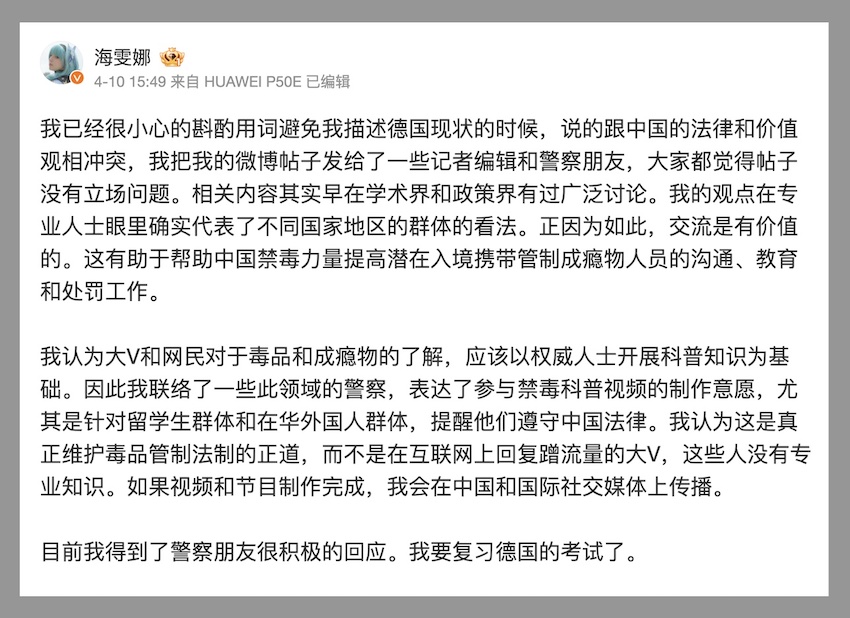
German influencer Navina Heyden (海雯娜). Image from Weibo.
A word of warning to all foreigners “telling China’s story well”: be careful not to tell your own country’s story well — at least, not in China. This is the cautionary tale that unfolded last week as Navina Heyden (海雯娜), a German influencer based in Shandong with 80,000 followers on both X and Weibo, published an article on Weibo discussing the partial decriminalization of marijuana in her home country.
Heyden explained that the policy, which took effect on April 1 and legalized recreational usage of cannabis by adults, aimed at reducing use by eradicating the black market. Countries without China’s historical sensitivities around drug use may think about the issue differently, she said, adding that, in her opinion, alcohol was more damaging to one’s health.
Though she took pains to emphasize that she was not advocating a similar approach in China, Heyden was subsequently attacked by netizens who accused her of “promoting drugs”, with some clamoring for a police investigation.
In a post directed at the firestorm around Heyden’s article, but not mentioning the influencer by name, “Beijing Anti-Drug” (北京禁毒), an official account operated by the drug enforcement division of the Beijing Public Security Bureau, warned readers against misguided opinions on drug use. “Do not be misled by the practices of individual Western countries, or fall under the influence of drug subcultures in the West,” the post read. “And do not, irrespective of the national conditions, talk about the legalization of drug abuse, or the bizarre theory of drug legalization.”
“Our country’s attitude towards drugs is one of zero tolerance!”
Internet user
Comments below the post mostly expressed outrage: “Our country’s attitude towards drugs is one of zero tolerance!” said one.
In a statement on April 10, the day after her original post, Heyden said she had carefully looked over the post with “journalists, editors, and police” before publishing, implying that no one had foreseen this degree of blowback.
While she did not exactly apologize for her remarks, Heyden did signal her readiness to leverage her influencer status for anti-drug messaging. “I [have] contacted some police officers . . . and expressed my willingness to participate in the production of anti-drug popularization videos, especially for the international student community and the foreigner community in China, to remind them to abide by Chinese laws,” she wrote.
Friend or Faux Pas?
To be the focus of accusations of negative foreign influence in China is a strange turn of fortune for Heyden, who since at least 2021 has frequently expressed opinions that align with the messaging of the Chinese Communist Party — for example, denying Taiwan’s right to self-determination and defending human rights abuses in Xinjiang.
Although she has worked with state media outlets like the People’s Daily and CGTN, however, she claims to be neither “pro-Germany” nor “pro-China,” and even sued Die Welt in 2021 for publishing an article that said she was covertly spreading propaganda for the PRC. However, the Institute for Strategic Dialogue in the UK ran a report on her Twitter feed, which found evidence that her account was being boosted by inorganic traffic and retweets from PRC diplomats and Huawei bigwigs (several of whom just happened to retweet her at exactly the same time).

Heyden has built a career off providing a German perspective for Chinese readers. She writes a column for nationalist website Guancha (观察) commenting on German affairs, and has often been touted as a friend to China, with Beijing Daily (北京日报) saying she is “loved” by Chinese and foreigners alike, and a perfect template of what the Party-state asks of foreigners who “tell China’s story well.” Weibo labeled her a “German girl who stands up for China.” Heyden commented below asking Weibo not to label her account as such — but this has apparently been ignored.
Attacks on Heyden are not what Beijing would like to see. They’ve taken great care to nurture foreign personalities willing to promote official viewpoints abroad. Former Global Times editor Hu Xijin argued when he weighed in on Weibo that Heyden’s stellar record of “defending China in the field of international public opinion” should earn her more tolerance, and that having her attacked from both sides would only make “Western public opinion applaud gleefully.”
When it comes to useful foreigners, however, “love” is far from unconditional.




















